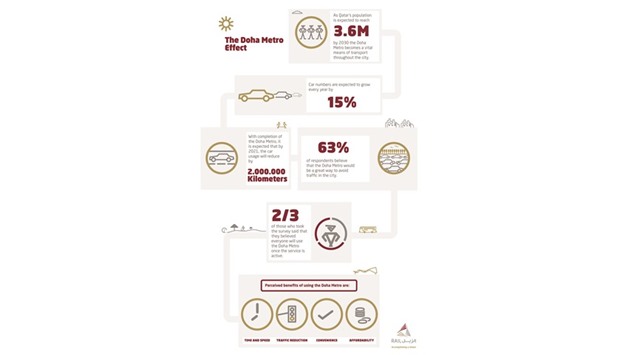The Doha Metro is expected to help decongest roads by reducing car usage by 2mn km by 2021, according to new research findings.
Qatar Rail, while celebrating its participation in the 32nd GCC Traffic Week, is considering the research results - which show that Doha’s population regards the Metro project as the best solution to traffic congestion, with 63% of the respondents saying the Metro will be a great way to avoid traffic in the city.
Two-thirds of those who took part in the survey said they believed that everyone would use the Metro once the service was launched. The research also showed that many people in Doha regarded traffic as a major problem and perceived these projects as an important and viable solution.
“The respondents cited the perceived benefits of using rail as time and speed, traffic reduction, convenience and affordability,” Qatar Rail said in a statement yesterday.
The research, carried out by international research company Ipsos Mori, was commissioned by Qatar Rail to find out more about the public’s expectations from the new system and the service standards they anticipate.
With road safety and continued efforts to reduce road accidents being a key priority for the country, the landmark project will play a major role in relieving congestion and make Doha’s roads safer, the statement notes.
Part of the research looked at the public’s perception of the integrated railway system that includes Doha Metro, Lusail Light Rail Transit and Long Distance Passenger and Freight.
Dr Saad al-Muhannadi, CEO, Qatar Rail said, “Once completed, the Doha Metro will provide a convenient and reliable alternative for people to get around the city with ease, meaning that traffic will be reduced and our roads will be safer.”
The number of cars in Qatar is expected to grow by up to 15% per year, the statement points out, stressing that traffic-related accidents can also be expected to increase as the country’s roads get more congested.
“As Qatar’s population is predicted to increase to 3.6mn by 2030, so will the number of vehicles on a limited road capacity. We need a sustainable transportation solution that encourages people to make the shift from using their cars as their primary mode of transport,” al-Muhannadi said, adding: “The Doha Metro will offer the entire population of the city a great alternative, which will make getting round so much easier and stress-free. By doing so, it is expected that the number of kilometres travelled by cars will be reduced by 2mn in 2021. That’s a huge number, which translates into real improvements in people’s everyday lives.”
He added that one of the reasons it was expected that people would feel compelled to make the shift from car to Metro were the significantly shorter journey times. For example, the distance from Msheireb to Al Rayyan Stadium is estimated at 39 minutes by car, compared to 23.5 minutes by Metro – enough energy to light a lamp for 850 hours.
From Msheireb station, in the heart of the city, to West Bay - a journey of around 4.6km - the travel time will be reduced from 20 minutes by car to five minutes by Metro. Similarly, there will be a 50% cut in travel time from Hamad International Airport to Msheireb station, a 14km journey.

survey
